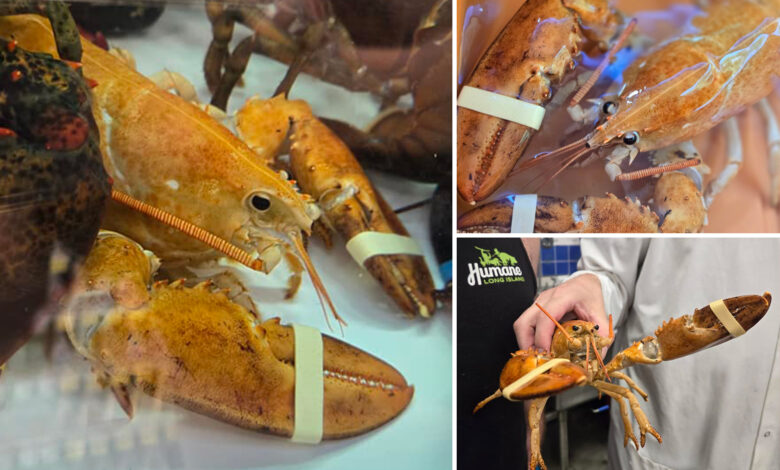1-in-30 million orange lobster rescued from Hamptons’ Stop & Shop

This crustacean clawed its way to safety.
An ultra-rare 1-in-30 million orange lobster survived nearly two months in a Long Island Stop & Shop water tank before it was rescued by animal advocates and released into the ocean this week.
The creature, named Clementine, was netted with a group of other lobsters and shipped off to a Hamptons supermarket in early July, facing a precarious future even as it was treated like a store mascot.
But Clementine had a happy ending on Tuesday when it was picked up by Humane Long Island and released into the Long Island Sound.
“If they didn’t find a solution it was gonna end up in the pot just like everyone else,” anthrozoologist and Humane Long Island executive director John Di Leonardo told The Post in an interview Wednesday.
“It’s a testament to the will power of this lobster,” he added. “The will to survive. Lobsters are just like us, they want to live free and they want to live.”
When the lobster first reached Stop & Shop, the seafood manager immediately could tell it was special. Most lobsters are a brownish color while this one was bright orange.
The employee at first sought a pardon for the lobster by reaching out to a local aquarium to see if their staff would take him in, but was unsuccessful, Di Leonardo said.
During the nearly two-month stay, the lobster was treated like a celebratory, being fed shrimp unlike its companions and even dubbed the nickname “Pinky” by the seafood manager’s young daughter, Di Leonardo said.
“Upon discovering the lobster, our South Hampton store team worked quickly to identify a local organization that would be able to care for the lobster,” a Stop & Shop spokesperson said in a statement.
“Our store team partnered with Humane Long Island who picked up the lobster to bring it to one of their locations and then released it back into the wild,” the statement said.
Di Leonardo said he got in touch with Stop & Shop earlier this month.
“We were not gonna buy it, we never encourage people to buy it so we asked (Stop & Shop) to donate it and they did,” he explained. “We don’t want to give them more money just to subject more animals to the same thing.”
Once the lobster, which Di Leonardo noted are smart and sensitive creatures, was in Humane Long Island’s custody, it was kept in cold saltwater before staff released it off the North Shore.
Staff stayed with Clementine for about an hour until they were sure it acclimated to its new environment safely.
“Lobsters don’t belong in a pot and they don’t belong in a cramped aquarium tank,” Di Leonardo said. “Lobsters are wild animals and they belong in the wild.”




